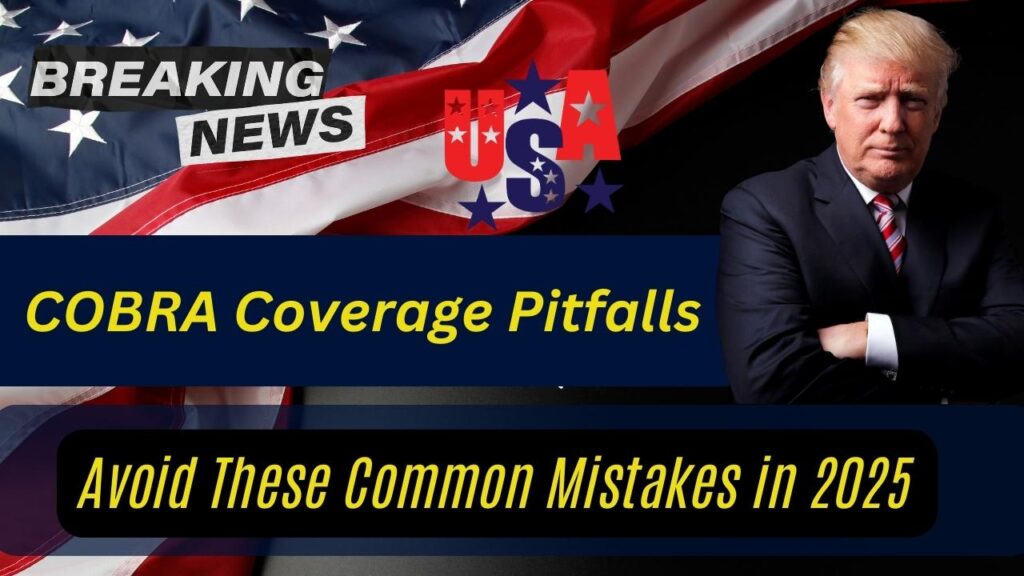COBRA Coverage Pitfalls – Losing a job or experiencing a major life change is stressful enough without worrying about health insurance. That’s why COBRA coverage exists—to help employees and their families keep their health benefits even after leaving an employer. However, navigating COBRA can be tricky, and mistakes can lead to lost coverage, unexpected costs, or legal trouble. In 2025, it’s more important than ever to understand how COBRA works and avoid common pitfalls.

COBRA Coverage Pitfalls
| Topic | Key Takeaways |
|---|---|
| COBRA Eligibility | Available to employees of companies with 20+ employees. Coverage applies after job loss, reduced work hours, divorce, or death of a covered employee. |
| Common Mistakes | Missing deadlines, miscalculating premiums, misunderstanding qualifying events, and not keeping accurate records. |
| Important Deadlines | Election notice must be sent within 14 days of a qualifying event; beneficiaries have 60 days to elect coverage. |
| Costs | Beneficiaries pay 102% of the premium (150% for disability extensions). |
| State Laws | Some states offer mini-COBRA for small businesses. |
| COBRA Alternatives | Marketplace plans, Medicaid, spouse’s employer plan, short-term health insurance. |
| Official Resource | Department of Labor – COBRA Overview |
COBRA is a vital safety net but comes with high costs and strict rules. Avoid common pitfalls by understanding deadlines, knowing your rights, and exploring alternative coverage options. Being proactive can save you money, prevent coverage gaps, and ensure smooth transitions during life changes.
Understanding COBRA Coverage
COBRA, or the Consolidated Omnibus Budget Reconciliation Act, allows employees and their families to continue their employer-sponsored health insurance after a qualifying event, such as job loss or reduced work hours. However, it is not automatic—you must elect COBRA coverage and pay the full premium (plus an administrative fee).
COBRA applies to businesses with 20 or more employees that offer group health insurance. Certain states also have mini-COBRA laws extending benefits to smaller employers.
Common COBRA Pitfalls and How to Avoid Them
1. Missing COBRA Deadlines
COBRA coverage is not automatic. You must elect coverage within 60 days of receiving the election notice. Employers must provide this notice within 14 days of a qualifying event.
🔹 Tip: Mark deadlines on your calendar and contact HR if you don’t receive a COBRA notice promptly.
2. Misunderstanding Qualifying Events
COBRA coverage applies after specific qualifying events, including:
- Job loss (except for gross misconduct)
- Reduction in work hours
- Divorce or legal separation from the covered employee
- Death of the covered employee
- A dependent child aging out of coverage
Mistake: Not recognizing an event as qualifying and failing to elect COBRA.
Tip: If any of these events apply, request COBRA details from your employer immediately.
3. Not Understanding COBRA Costs
Unlike employer-subsidized insurance, COBRA requires you to pay the full premium plus a 2% administrative fee—or 150% if on disability extension.
Example: If your employer paid $500 of a $600 monthly premium, you’ll now owe $612 ($600 + 2%).
Tip: Check state or federal subsidies, like the American Rescue Plan Act (ARPA), which temporarily lowered COBRA costs in recent years.
4. Overlooking Alternative Coverage Options
COBRA isn’t the only option. Consider:
- Marketplace plans via HealthCare.gov
- Medicaid (if eligible)
- Spouse’s employer-sponsored plan
- Short-term health insurance for temporary coverage
Tip: Compare COBRA vs. Marketplace plans using online calculators to find the best option.
5. Failure to Pay Premiums on Time
COBRA premiums must be paid on time to maintain coverage. There’s a 30-day grace period for missed payments, but late payments can result in loss of coverage.
Tip: Set up automatic payments or reminders to ensure timely payment.
6. Not Keeping Proper Documentation
Employers and beneficiaries should keep records of:
- COBRA notices
- Election forms
- Payment confirmations
- Communication with insurers
Tip: Save emails, PDFs, and physical copies to resolve disputes if needed.
7. Ignoring State-Specific COBRA Rules
Some states extend COBRA benefits beyond federal requirements.
Tip: Check state-specific mini-COBRA laws if you work for a small business.
8. Not Considering Special Enrollment Periods
Losing employer coverage qualifies you for a special enrollment period on the Health Insurance Marketplace.
Tip: Compare plans and enroll in cheaper or more comprehensive coverage if COBRA is too expensive.
9. Miscommunication Between Employers and Insurers
Employers must properly notify insurance providers of COBRA elections.
Tip: Confirm with your insurer that your COBRA coverage is active after electing it.
10. Assuming COBRA Covers Everything
COBRA continues the same plan you had, but does not include new benefits. If your employer changes plans, your COBRA coverage may also change.
Tip: Review plan updates annually.
COBRA Premiums Set to Increase by 7% in 2025, Is Your Budget Ready?
COBRA Coverage in 2025: What You Must Know to Keep Your Health Insurance!
New COBRA Regulations Could Impact Your Health Coverage; Act Now!
FAQs
1. How long does COBRA coverage last?
COBRA typically lasts 18 months, but can extend to 36 months for certain qualifying events.
2. Can I switch to a cheaper plan while on COBRA?
No, you must stay on the same plan unless switching during open enrollment or qualifying for other coverage.
3. What happens if I miss a payment?
You have a 30-day grace period, but after that, coverage is terminated permanently.
4. Can my employer refuse to offer COBRA?
If they have 20+ employees and offer group health insurance, they must comply with COBRA regulations.
5. Are there financial aid options for COBRA?
Check if you qualify for state or federal subsidies, Medicaid, or lower-cost Marketplace plans.
6. Can I get COBRA if my employer goes out of business?
If the employer shuts down and the health plan is terminated, COBRA is not available.
7. Does COBRA cover dental and vision insurance?
Yes, if the employer-sponsored plan included dental and vision, COBRA continues those benefits.







